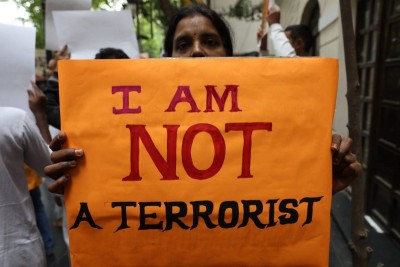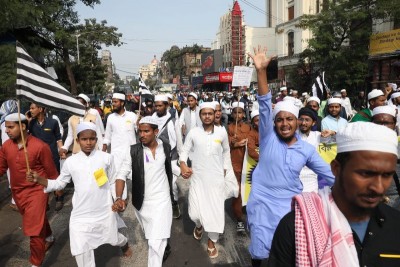 India-Bangladesh
India-Bangladesh
India-Bangladesh forging a model relationship
On the evening of November 15, Indian External Affairs Minister S. Jaishankar hailed the India-Bangladesh relationship as a "model" in the Indian subcontinent.
He emphasized the remarkable progress achieved in bilateral ties over the past decade, responding to Bangladesh High Commissioner Saida Muna Tasneem's inquiry during the interaction titled 'How a Billion People See the World' at the Royal Over-Seas League in London. Dr. Jaishankar lauded the relationship's prominence in terms of regional cooperation benefits.
Addressing the restructuring of the neighbourhood, he highlighted significant achievements, including the resolution of the land boundary with Bangladesh and the amicable adherence to the arbitral award on maritime boundaries.
Despite challenges, this approach serves as a positive pattern for the region.
Over the last decade, India and Bangladesh have enhanced connectivity through rail links, established a power plant, and utilized Bangladesh's ports for Indian northeast traffic, exemplifying the mutually advantageous nature of their evolving partnership.
India and Bangladesh jointly inaugurated three significant infrastructure projects that were constructed with Indian aid at the onset of this November.
These projects include a ground-breaking railway line that will establish the first-ever direct rail connection between India's north-eastern states and Bangladesh.
Prime Minister Narendra Modi and his Bangladeshi counterpart Sheikh Hasina jointly inaugurated three projects via a virtual ceremony: the Akhaura-Agartala cross-border rail link, the Khulna-Mongla port rail line, and unit II of the Maitree super thermal power plant.
Under the able leadership of Prime Minister Modi, India has become Bangladesh's most significant development partner, providing nearly $10 billion in grants and concessional loans.
During the ceremony, Modi highlighted the shared commitment of both nations to enhancing infrastructure and connectivity to better serve their citizens.
He pointed out that over the past nine years, they have established three new bus routes, three new rail routes, and four new immigration checkpoints. In 2022, they also introduced container and parcel trains.
Bangladesh holds a significant position in India's "Neighbourhood First" policy. Many development initiatives funded by India are dedicated to boosting connectivity between Bangladesh and India's landlocked north-eastern region, which is strategically important.
These initiatives are accompanied by regular communication and interaction at the ministerial, bureaucratic and the people to people level between Bangladesh and India’s north-east.
In a recent milestone, the 11th edition of Bangladesh-India Friendship Dialogue was jointly organized by the Bangladesh Foundation for Regional Studies and the India Foundation in Sylhet, Bangladesh.
Inaugurated on October 05, it witnessed multifaceted discussions on ‘Investment for Sustainable and Inclusive Growth’, underscoring the importance of regional development. It was part of a four-day "Bangladesh-India Friendship Dialogue" from October 5-8 to reinforce amicable ties between the two nations and foster growth in education, culture, and business sectors.
The Bangladesh-India Friendship Dialogue has been a key forum for strengthening bilateral ties for the past decade. This year's theme is "Fostering a comprehensive and mutually beneficial partnership."
Six ministers and 20 MPs represented Bangladesh, while a 140-member Indian delegation joined the event in Sylhet.
Indian Minister of State for External Affairs Dr Rajkumar Ranjan Singh addressing the inaugural session of the second Sylhet-Silchar festival on 6 October, highlighted the importance of India-Bangladesh relations for regional cooperation and development, according to an update by the Indian High Commission in Bangladesh.
He commended Bangladesh Prime Minister Hasina's government for strengthening ties with India and achieving impressive socio-economic development in the past 14 years.
Singh also praised the recent progress on connectivity projects between Bangladesh and India's north-eastern states, emphasizing the two regions can work together to improve people's lives.
The first edition of the festival was held on December 2-4, 2022 in Silchar, Assam. The Sylhet-Silchar festival connects two cities through celebrating culture and shared experiences. Bangladesh’s Minister for Foreign Affairs AK Abdul Momen, who was chairing the session, observed that the Sylhet-Silchar Festival would showcase shared culture, cuisine, and aspirations, strengthening ties with North-East India.
Bangladesh Foreign Minister A K Momen, who was chairing the session, hoped for the Sylhet-Silchar Festival to play a vital role in boosting relations, especially with the north-east region, by showcasing their common culture, similar cuisine, and shared aspirations.
Calling India the most important country in South Asia and emphasizing the significance of the growing partnership between Bangladesh and India, Momen expressed confidence that the newfound partnership between Bangladesh and India would usher in shared peace and prosperity in the region.
He also expressed Bangladesh's desire for visa-free travel between the two countries, adding that both countries were eager to establish a visa-free relationship and expedite the visa process.
Momen reaffirmed the commitment of both countries to strengthening bilateral ties in trade, education, culture, society, and technology.
The Speaker of Bangladesh Parliament, Dr. Shirin Sharmin Chaudhury,was the chief guest. Other speakers included Vincent Pala and SwapanDasgupta, Indian Parliament Members, and PranayVerma, Indian High Commissioner to Bangladesh. r.Chaudhury observed that Bangladesh and India are inextricably linked, and their destinies are intertwined.
She also thanked India for including Bangladesh in the G20 process and for and hosting the P20 Parliamentary Speakers' Summit.
She said that Bangladesh looked forward to greater parliamentary engagement, collaboration between women lawmakers, and cooperation in ICT to face the challenges of the 4th Industrial Revolution.
Other speakers commended the initiative of organizing the Sylhet-Silchar Festival, accentuating the mutual benefits of fostering meaningful and effective cooperation and interactions between Bangladesh and India's northeastern states, adding that such collaboration would prove advantageous for the people of both regions.
Over the course of the dialogue, policymakers, experts, academics, and practitioners discussed issues of common interest and identified opportunities and challenges for building a strong and mutually beneficial partnership between the two nations. At the concluding session, the "Sylhet Declaration" was adopted, summarizing the key takeaways from the 11th round of the friendship dialogue.
The dialogue resolved to strengthen the enduring friendship between the two nations by cultivating a comprehensive and mutually advantageous partnership. Building upon the successes of the previous round, the dialogue has outlined a roadmap for further engagement, paving the way for a more robust and dynamic Bangladesh-India relationship.
The world is shifting away from the WTO's non-preferential tariff system, which is facing a crisis due to widespread tariff wars, and embracing preferential tariffs through bilateral or multilateral agreements.
India has taken the lead by prioritizing Comprehensive Economic Partnership Agreements (CEPAs). A recent CEPA between India and the UAE resulted in a 20% increase in bilateral trade.
Entering a CEPA with the world's fifth-largest economy and fastest-growing major economy is in Bangladesh's best interests. However, Bangladesh's Prime Minister Sheikh Hasina has broader ambitions. Under her 15 years of uninterrupted rule since 2008, she has been credited with increasing Bangladesh's GDP by more than five times.
During this period, the two countries have settled their long-standing border disagreements, both on land and at sea.
Resolving the maritime boundary will make Bangladesh more attractive for investments in the blue economy.
Coastal shipping routes have been established. Cross-border passenger train and bus traffic has increased significantly.
The much-anticipated Kolkata-Dhaka container train service is expected to commence as soon as the Padma Bridge railway component is finished. People-to-people interactions between the two nations have more than doubled. India now grants over 20 lakh visas annually to Bangladeshis, up from around 9 lakh visas in 2014. India's visa operation in Bangladesh is the largest for any country in the world.
This period also witnessed significant improvements in both hard and soft infrastructure in India.
Once the 10th largest economy in 2014, India has now ascended to the fifth position and is on the brink of claiming the status of the third-largest economy, trailing only the USA and China. Notably, India has solidified its position as a superpower in the IT and pharmaceutical industries, marking a significant transformation in its economic landscape.
This upward trajectory positions India as a key player in the global economic arena, showcasing remarkable growth and influence in sectors crucial to technological advancement and healthcare.
Top of Form
India has made significant strides in various sectors over the past decade, establishing itself as a global leader in digital services, solar power, telecommunications, and space technology. With its successful lunar mission, India became the fourth nation to achieve this feat.
Once primarily centred on services, Indian economy is now transforming into a manufacturing powerhouse. Mobile phones and military hardware are among the country's fastest-growing export products.
Sheikh Hasina's aspirations align with this shared vision of prosperity. She envisions Bangladesh among the world's most thriving nations. Achieving this shared dream necessitates shared growth.
Comprehensive cooperation between India and Bangladesh can unlock a new era of enhanced trade and investment opportunities.
Bangladesh and India have already established a shared electricity grid and a pipeline for refined petroleum products. Bangladesh is well-positioned to benefit from India's growing status as a hub for green hydrogen production.
The proposed India-Middle East Economic Corridor (IMEC) and the existing International North-South Transport Corridor (INSTC) linking India and Russia could provide Bangladesh with a significant advantage in accessing markets between the Caspian and Mediterranean Seas and in the West at a lower cost.
Along with other development partners, India is pursuing a broader transnational connectivity initiative than China's Belt and Road (BRI) project. Unlike BRI, India's model would not burden participating countries with excessive debt. Bangladesh is strategically poised to capitalize on these emerging opportunities.
During the 11th friendship dialogue, Bangladesh Foreign minister Momencalled for closer collaboration with India in key areas, including trade, connectivity, energy, water, and people-to-people ties, urging India to expedite visa processing, aiming to increase daily approvals from 9,000. Bangladesh proposed the launch of a new air route connecting Dhaka, Guwahati, and Sylhet. India was requested to initiate operations on the Dhaka-Guwahati air link.
Looking ahead, India-Bangladesh relation can only go from strength to strength.
There can be a common electricity grid, similar to India-Bhutan. India has already offered a rupee-trade window to Bangladesh to help Dhaka reduce its demand for the US dollar.
In the days to come, a convertible or partly-convertible Indian rupee might replace the dollar trade altogether between the two countries. Bangladesh has disproved the religion-based Two Nation Theory behind the Partition of India in 1947.
Its independence from Pakistan in 1971 and the peaceful coexistence with India for over 50 years have little parallel across the world. The visionary leadership of Sheikh Hasina in strengthening regional cooperation helped South Asia neutralize much of the toxicity emanating from Pakistan. A comprehensive cooperation between India and Bangladesh can be a model for the entire world to pursue growth and prosperity.
Support Our Journalism
We cannot do without you.. your contribution supports unbiased journalism
IBNS is not driven by any ism- not wokeism, not racism, not skewed secularism, not hyper right-wing or left liberal ideals, nor by any hardline religious beliefs or hyper nationalism. We want to serve you good old objective news, as they are. We do not judge or preach. We let people decide for themselves. We only try to present factual and well-sourced news.







